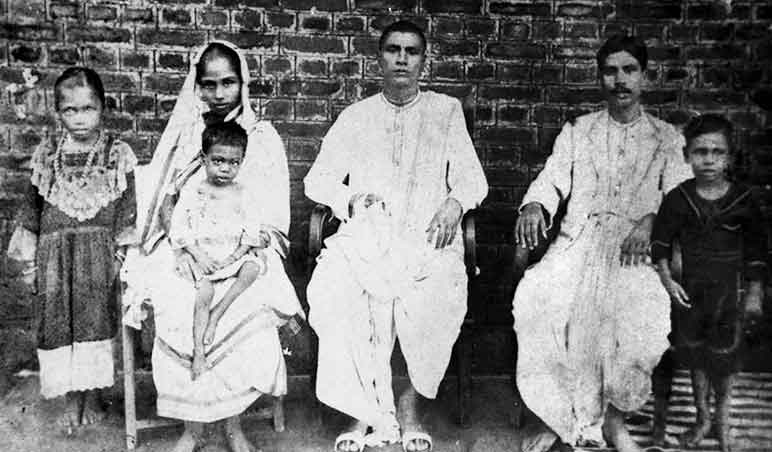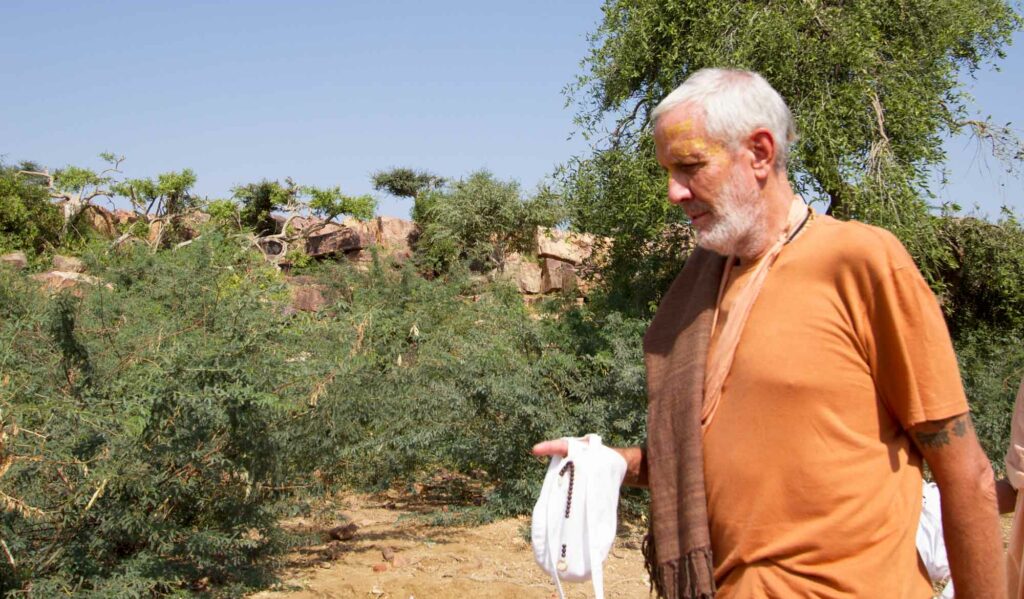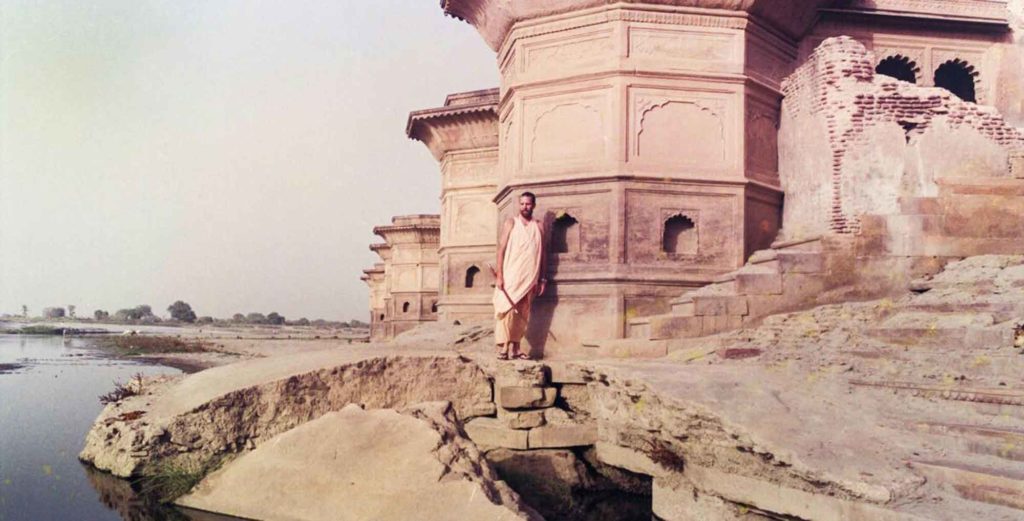Overview
In commemoration of the 119th appearance of Śrīla Śrīdhara Mahārāja, we present the following article 'Oh Bābā! Bolacche-re!' (My God! He's forcing me to spell!) which was written by Śrīla Śrīdhara Maharaja, prior to his acceptance of sannyāsa, for the Gauḍīya Maṭha’s daily newspaper, Dainika Nadīyā Prakāśa on April 18th, 1928. This article was translated from Bengali to English by Sanātana Dāsa.
One gentleman had a son, and like any parent, when his son was of age to begin formal learning, he endeavoured to provide his child with proper tuition. However, the boy showed an extraordinary aversion towards receiving any type of education. The father became very anxious about his son’s future, but after much endeavour, he ultimately became completely disheartened.
Finally, one experienced teacher came to know of his dejection and told him that he would tactfully teach the boy. On investigating, he came to know that the boy was very fond of various types of food and was greatly influenced by his taste buds. The teacher took advantage of this particular weakness of the boy, and mesmerised the child by discussing various types of food and their qualities. Continuously he made the boy utter the names of fruits like mango, jamun, jackfruit, banana etc. several times. Gaining confidence, the teacher then asked the boy, “Son – say ka!” (the first letter of the alphabet). Instantly the boy came to his senses. It came as a flash of lightning in the boy’s mind that this was all a ploy to make him study. The boy exclaimed, “Oh Bābā! Bolacche-re!” (My God! He’s forcing me to spell!”)
If we deliberate on this with a calm mind, we will find our condition more precarious than that of the aforementioned boy. The Vaiṣṇavas, who are ācāryas of the entire world, having seen the future destination of our souls with their divine vision and being very liberal by nature, have compassionately endeavoured to give us an opportunity to honour varieties of mahā-prasāda in this mundane sphere of enjoyment to engage the souls in their constitutional occupation of devotional service.
But what are we doing? Until we are unable to trace any mundane spirituality in our imaginary mental indulgence in gross matter for our own pleasure, then we are somewhat halfheartedly practicing devotional service in the association of sādhus. When our addiction to the fleeting and temporary aspects of life diminishes due to the infallible consequences of sādhu-saṅga, we are taken aback.
And in spite of realising the insignificance of the lowliness of our self that we have served in the mental realm of our understanding of religiosity, which we have assimilated deeply in our inner being for various lifetimes, we are still unwilling to reject it. On the contrary, seeing the prospect of its disappearance, we tremble in fear at the extermination of our very deeply acquired self!
Just like the boy who was oblivious to his own future, we also want to remain blind to the destiny of our souls. Yet if we compare the loss incurred in both cases, we find that we cannot compare our own deplorable circumstance to that of the boy’s condition.
The boy is simply loosing something in exchange for something else. But whatever he looses or gains belongs to the same category – enjoyment of the tongue and discussion on mundane knowledge (whose aim is to achieve higher material enjoyment) are categorically the same. Both are worldly, transient and illusory.
In spite of daily hearing the warning bells of the thunderous declarations from Śrī Gauḍīya Maṭha and witnessing all kinds of endeavours by the maṭha residents to instil and nurture within our hapless sick minds the seeds of nectarean hari-kathā, and endeavouring to establish a loving connection with God – still there is a gulf of difference between that which we are knowingly rejecting in favour of some other illusory charm!
One is of this world, while the other is eternal; one is insignificant and negligible, while the other is supremely beneficial; one is intimately connected to birth, death, old age and disease, while the other is eternal transcendental bliss; one is in the mode of illusion, while the other is purely spiritual, beyond the modes of material nature. To sum up, one is uninterrupted pain and toil while the other is incessant bliss.
In such a situation, I would like to ask the intelligent and good-hearted readers that if we sincerely desire to reform our mentality, which is like that of the aforementioned boy, then considering that which is eternal and that which is temporary, what should the proper activity of the living entities be? Isn’t this the very conduct and preaching of Śrī Gauḍīya Maṭha?
Paṇḍita Śrī Rāmendra-sundara Bhaṭṭācārya B.A.
Related Articles & Books
- Vaiṣṇava Nindā by Śrīla Bhaktivinoda Ṭhākura
- A Devotee is Merciful (Sajjana – Kṛpālu) by Śrīla Bhaktisiddhānta Sarasvatī Ṭhākura
- A Devotee Does Not Engage in Violence (Sajjana – Akṛta-droha) by Śrīla Bhaktisiddhānta Sarasvatī Ṭhākura
- A Devotee is the Epitome of Truth (Sajjana – Satya-sāra) by Śrīla Bhaktisiddhānta Sarasvatī Thākura
- Śiva-tattva & the Position of Lord Śiva by Śrīla B.R. Śrīdhara Mahārāja
- Oh Bābā! Bolacche-re! by Śrīla B.R. Śrīdhara Mahārāja
- Problems and Solutions by Śrīla B.R. Śrīdhara Mahārāja
- The Highest Attainment and Present Adjustment by Śrīla B.R. Śrīdhara Mahārāja
- Āgun Jvālbe (Light the Fire!) by Śrīla B.R. Śrīdhara Mahārāja
- Dharma and the Modern World by Śrīla A.C. Bhaktivedānta Swami Prabhupāda
- Faith Confirms the Absolute by Śrīla B.G. Narasiṅgha Mahārāja
- Go Deeper! by Śrīla B.G. Narasiṅgha Mahārāja
- To Be a Servant by Śrīla B.G. Narasiṅgha Mahārāja
- Harmony – Real and Apparent by Swami B.V. Giri
- The Definition of Faith by Gaura Gopāla Dāsa
- Ātma Samīkṣā – The Value of Introspection by Kalki Dāsa
- Frogs in the Well of Prejudice by Kalki Dāsa
Further Reading
- Śraddhā (Faith) – Quotes by Bhaktivinoda Thakura
- Śraddhā and Śaraṇāgati by Śrīla Bhaktivinoda Ṭhākura
- The Association of Sādhus by Śrīla Bhaktivinoda Ṭhākura
- Epilogue to Śrī Kṛṣṇa Karṇāmṛta by Śrīla Bhaktivinoda Ṭhākura
- Prīti (Love) by Śrīla Bhaktivinoda Ṭhākura
- A Dispute Concerning Mahāprasāda by Śrīla Bhaktivinoda Ṭhākura
- Śraddhā by Śrīla Bhaktivinoda Ṭhākura
- Materialistic Association by Śrīla Bhaktivinoda Ṭhākura
- Dispelling Doubts by Śrīla Bhaktivinoda Ṭhākura
- The Enemy by Śrīla Bhaktivinoda Ṭhākura
- A Critique of the book ‘Vanamālā’ by Śrīla Bhaktivinoda Ṭhākura
- Kali by Śrīla Bhaktivinoda Ṭhākura
- Offences Against Bhakti by Śrīla Bhaktivinoda Ṭhākura
- Kārttika-vrata by Śrīla Bhaktivinoda Ṭhākura
- Violence and Mercy by Śrīla Bhaktivinoda Ṭhākura
- Abandoning Bad Association by Śrīla Bhaktivinoda Ṭhākura
- Sad-guṇa and Bhakti by Śrīla Bhaktivinoda Ṭhākura
- The Process of Initiation by Śrīla Bhaktivinoda Ṭhākura
- Dainya (Humility) by Śrīla Bhaktivinoda Ṭhākura
- Vaiṣṇava Nindā (Offences to Devotees) by Śrīla Bhaktivinoda Ṭhākura
Prema Dhāma Deva Stotram with the Narasiṅgha Sevaka Commentary – Verses 61-65
In verses 61 to 65 of 'Prema Dhāma Deva Stotram', Śrīla Śrīdhara Mahārāja narrates the pastime of Śrī Caitanya at Caṭaka Parvata In Purī and explains how the scriptures produced by Brahmā and Śiva are ultimately searching for the personality of Mahāprabhu who is merciful too all jīvas, no matter what their social position.
Prabhupāda Śrīla Sarasvatī Ṭhākura’s Visit to Ayodhyā
With the forthcoming observance of Śrī Rāma Navamī, we present 'Prabhupāda Śrīla Sarasvatī Ṭhākura’s Visit to Ayodhyā' written by Śrīla Bhaktisiddhānta Sarasvatī Ṭhākura Prabhupāda from The Gaudīyā magazine, Vol 3. Issue 21/ In December 1924, after visiting Benares and Prāyāga, Sarasvatī Ṭhākura visited the birth-site of Śrī Rāmācandra in Ayodhyā.
Śaraṇāgati – The Only Path to Auspiciousness
In this article, 'Śaraṇāgati - The Only Path to Auspiciousness', Dhīra Lalitā Dāsī analyses the process of śaraṇāgati (surrender) beginning with śraddhā (faith). She also discusses the role of śāstra and the Vaiṣṇava in connection with surrender.
Ātma Samīkṣā – The Value of Introspection
In this article, "Ātma Samīkṣā – The Value of Introspection" Kalki Dāsa highlights the importance of introspection in the life of a devotee and especially in relation to the worldly environment that surrounds us. He also explains how transcendental sound influences our capacity to introspect.
Prema Dhāma Deva Stotram with the Narasiṅgha Sevaka Commentary – Verses 61-65
In verses 61 to 65 of 'Prema Dhāma Deva Stotram', Śrīla Śrīdhara Mahārāja narrates the pastime of Śrī Caitanya at Caṭaka Parvata In Purī and explains how the scriptures produced by Brahmā and Śiva are ultimately searching for the personality of Mahāprabhu who is merciful too all jīvas, no matter what their social position.
Prabhupāda Śrīla Sarasvatī Ṭhākura’s Visit to Ayodhyā
With the forthcoming observance of Śrī Rāma Navamī, we present 'Prabhupāda Śrīla Sarasvatī Ṭhākura’s Visit to Ayodhyā' written by Śrīla Bhaktisiddhānta Sarasvatī Ṭhākura Prabhupāda from The Gaudīyā magazine, Vol 3. Issue 21/ In December 1924, after visiting Benares and Prāyāga, Sarasvatī Ṭhākura visited the birth-site of Śrī Rāmācandra in Ayodhyā.
Śaraṇāgati – The Only Path to Auspiciousness
In this article, 'Śaraṇāgati - The Only Path to Auspiciousness', Dhīra Lalitā Dāsī analyses the process of śaraṇāgati (surrender) beginning with śraddhā (faith). She also discusses the role of śāstra and the Vaiṣṇava in connection with surrender.
Ātma Samīkṣā – The Value of Introspection
In this article, "Ātma Samīkṣā – The Value of Introspection" Kalki Dāsa highlights the importance of introspection in the life of a devotee and especially in relation to the worldly environment that surrounds us. He also explains how transcendental sound influences our capacity to introspect.








